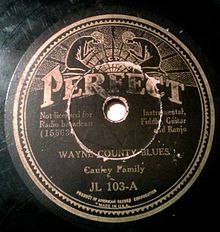Cauley Family
| Cauley Family | |
|---|---|
| General information | |
| Genre (s) | Old-time music |
| Founding members | |
| Roland Cauley | |
Guitar , vocals |
Lake Howard |
| ? Cauley | |
The Cauley Family was an American string band .
history
According to Tony Russell and Paul Oliver, the Cauley Family was from Florida . In 1934, James Baxter Long, manager of a United Dollar Stores branch, held a talent competition in Kinston, North Carolina to find a suitable artist for his composition Lumberton Wreck . The play was about a train wreck near Lumberton in which some tobacco farmers were killed. The Cauley Family won this competition and got the chance to hold sessions for the American Record Corporation (ARC). On August 7, 1934, Roland Cauley began to record in New York City with his neighbor Lake Howard, but they were not published.
That same day, the Cauley Family began recording as a group, including the well-known fiddle tune I Don't Love Nobody , released by ARC under the name Duplin County Blues . Further sessions followed up to August 9, during which a number of songs were recorded. ARC released under the names Cauley Family , Roland Cauley & Lake Howard or Cauley Family & Howard on their various labels such as Banner Records , Perfect Records , Oriole Records and others.
The Cauley Family never made records again after that.
Discography
| year | title | # | Remarks |
|---|---|---|---|
| Published titles | |||
| Banner Records | |||
| Lumberton Wreck / New River Train | 33146 | ||
| Duplin County Blues / Seaboard Waltz | 33147 | ||
| Perfect Records | |||
| Gray Eagle / Medley - Darling Nelly Gray and Little Brown Jug | JL 100 | ||
| JL 102 | |||
| Wayne County Blues / Medley - Mississippi Sawyer and Soldier's Joy | JL 103 | ||
| Other recordings | |||
| 1934 |
|
ARC | unpublished |
literature
- Paul Oliver, Tony Russel, Robert MW Dixon: Yonder Come the Blues: The Evolution of a Genre. Cambridge University Press, 2001, ISBN 0-521-78777-7 , p. 234.
- Stefan Grossman: Stefan Grossman's Early Master of American Blues Guitar: Blind Boy Fuller. Alfred Music Publishing, 1993, ISBN 0-7390-4331-5 , p. 7.
- Tony Russell: Country Music Records: A Discography, 1921-1942. Oxford University Press, 2005, ISBN 0-19-513989-5 , pp. 198-199.
Web links
Individual evidence
- ^ Yonder come the blues. P. 234.
